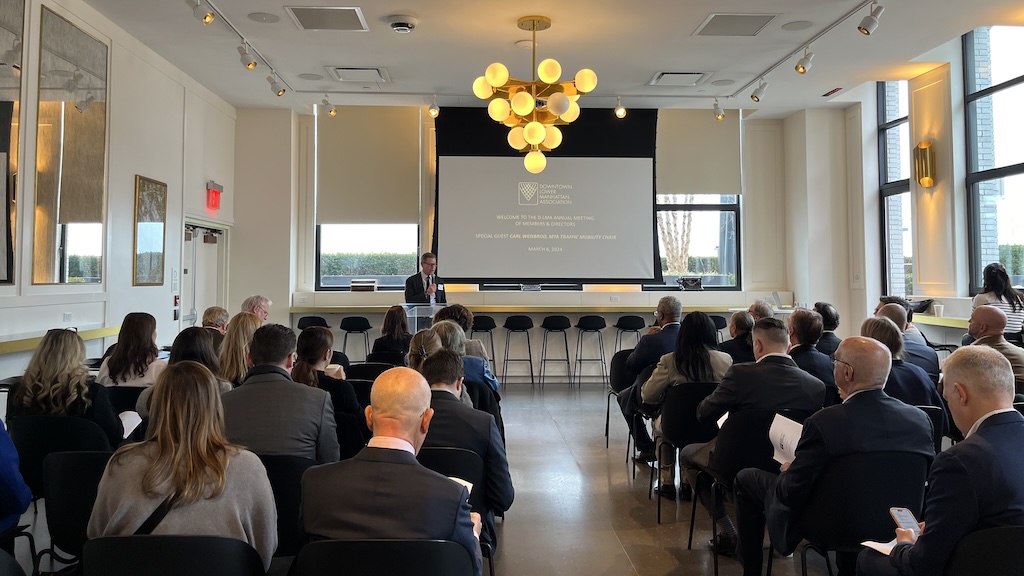D-LMA 2024 Annual Meeting of the Members, 03.06.2024

Ric Clark opens the 2024 D-LMA annual meeting.
At the Downtown-Lower Manhattan Association (D-LMA)’s annual meeting of the members and directors held on March 6, 2024, MTA Traffic Mobility Review Board Chair and former City Planning Chair Carl Weisbrod spoke about how the proposed congestion pricing initiative will impact the city and, specifically, Lower Manhattan.
In its current iteration of the plan, congestion pricing would affect any driver entering the Central Business District (CBD) which stretches from 60th Street in Manhattan all the way down to the southern tip of Lower Manhattan. Passenger vehicles would be charged $15, trucks would be charged between $24 – $36 depending on size and motorcycles would be charged $7.50. The standard daytime toll rate will apply from 5 a.m. to 9 p.m. on weekdays, and from 9 a.m. to 9 p.m. on weekends. The base toll will be reduced by 75 percent for those entering Manhattan between the hours of 9 p.m. and 5 a.m on weekdays and between 9 p.m. and 9 a.m. on weekends.
“The basic principles are to address the needs of the many, not the few,” Weisbrod said. The “many” he’s referring to are the 1.3 million people who commute into the CBD on public transit every day. Weisbrod explained that reducing congestion in the CBD would improve life in the city threefold: 1) by reducing emergency services response times, 2) by reducing pollution and 3) by generating capital for the MTA.
The proposed congestion pricing toll would directly be responsible for one third of the organization’s $45 million, five-year capital program.
Weisbrod reassured the group that the MTA Traffic Mobility Review Board recommended keeping the base toll as low as possible, and in order to do this, only a select few exemptions can be included in the plan; the more exemptions offered, the higher the base toll must be in order to generate the necessary funds for the MTA. As it stands, the plan will offer exemptions for commuter buses, emergency vehicles, specialized public vehicles (like garbage trucks) and those with disabilities. The recommended plan further outlines reduced rates offered for motorcycles (which contribute less to congestion than larger vehicles), 50 percent reduction for the first 10 rides per month for those making less than $50,000 annually; and, potentially, school buses. Ride-share passengers including Uber and Lyft will be charged a fee of $2.50 per ride for trips beginning, ending or within the boundaries of the central business district, and passengers in taxis will be charged $1.25 for the same.
When asked if he was worried about the proposed toll potentially deterring hybrid workers from coming into the office, furthering the city’s commercial real estate crisis, Weisbrod reiterated, “The goal of the program is to enhance the economy, not to constrain the economy.” The program will speed up traffic and commuting time for those who drive. In fact, congestion pricing is a key recommendation of Governor Hochul’s and Mayor Adams’s New New York plan to revitalize the CBD
“The benefits of reduced congestion on commuting time will be significant,” he said. Weisbrod then pointed to other cities employing similar congestion tolls including London and Stockholm as success stories, citing London’s decrease in traffic congestion and an increase in people within the CBD as a direct result of this imposed toll.
Weisbrod went on to explain that the capital raised from the proposed toll will address MTA improvements in at least three main categories: 1) state of good repair and accessibility, 2) expansion (i.e. the Second Avenue Subway) and 3) sustainability and resiliency. .
In addition to the discussion on congestion pricing, the D-LMA Board Members approved the minutes for last year’s annual meeting and approved this year’s Board of Directors. Ross Moskowitz and T.J. Gottesdiener rotated off the Board of Directors.